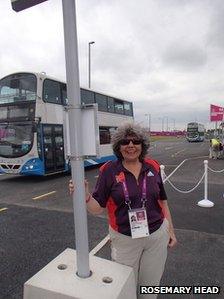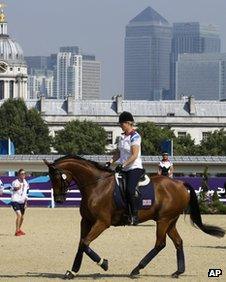London 2012 volunteers prepare for moment in spotlight
- Published

Waiting for an Olympic bus: Rosemary Head smiles throughout her shift
The months of waiting, the hours of training, the hype, the expectations, the uniform... no, it's not the Olympic athletes, it's the Games volunteers who are finally ready.
From staffing a bus stop to dancing in the stadium, volunteers are being used in myriad roles throughout the 2012 London Games.
The so-called Games Makers were selected from 240,000 people who applied almost two years ago, knowing that they would have to devote some time, perhaps a little expense, and some patience just to get to the starting line.
Take Rosemary Head. The 72-year-old has volunteered to be stationed at the bus terminal within the Olympic Park from 4pm to midnight.
She counts the athletes onto the buses, checks they have the correct security passes, and sends the drivers on their way. You wouldn't want a swimmer ending up at a horse event at Greenwich, would you, she says.
Even before the opening ceremony she had done six shifts, and washed her purple and beige uniform a couple of times, finding the shirt "a bit warm" for London's long-awaited summer heat.
Second chance
As her official socks dry out her flat window in Laindon, Essex, before her next shift, she explains how her attitude has gone from excitement, to shock, then disappointment and back to excitement.
She applied, even though she thought her age would be a drawback, and was surprised to get an interview, and then be selected as a driver.
"You can't pick and choose your role, but when I realised I'd be driving a brand new BMW around central London, I had to say no. If you decline a role, you're not usually given a second chance, so I was really lucky that they offered me the bus role," she added.
A "bus team member" may not sound that exciting, but for Ms Head every day is different.
"I was a bit disappointed at first, but then people kept saying how lucky I was to be inside the village, and now I think it's the best job in the world."
However, one drawback is the late finish to her shift. With the athletes' buses stopping before 2200 BST, it seems unfair to make people who live far from the venue stay until midnight, she says.
"If I was getting paid for it, I would understand. But I just wish the organisers would take into account how long your travel time is."
Not that that should bother Martin Dean. He will be driving, in 10-hour shifts, one of the logo-emblazoned cars between venues, hotels and airports.
When the opening ceremony finishes in the early hours of Saturday morning, he'll be waiting to whisk members of the "Olympic family" to their accommodation.
"I'm just pleased to be involved. I'm retired, so I have time to fit it in, and it's a once in a lifetime opportunity - especially at my age," says the 66-year-old.
Some volunteers are still training - or rather, rehearsing - for their roles. Dancers for the closing ceremony are still fine-tuning their routines after 60 hours.
James volunteered because he wanted to feel "a personal connection with the Games".
"It sounds like a cliche to say it's a once-in-a-lifetime opportunity, but how often do you have the chance to be part of something like this? Chances are, never again in my lifetime."
He has another 50 hours of rehearsals for his role, and says the drawbacks include "waiting around at rehearsals, often in the rain, and some days it feels like we haven't achieved much."
He adds: "For me personally it's been really satisfying and inspiring - meeting and bonding with the people you're performing with, and doing something that's so physical and so vastly different from my normal life working in an office."
The "once in a lifetime" theme is echoed by 63-year-old Kate, volunteering in the accreditation section at Greenwich for equestrian events.
The role wasn't her ideal job, but she says at least she's at a sporting venue rather than at Heathrow airport.
'Crikey, this is it'
Her minor quibbles include the cost of travelling from her home in Southampton to London for training, which she describes as "rather perfunctory", and the uniform - "not very user-friendly in the heat".

All athletes have to be accredited at their venues
Heading back to her tent in a camping ground after a shift, she is upbeat.
"All the lead-up was a bit remote for me, but when you're actually on site, then it's like, crikey, this is it. It suddenly comes home to you that this is the Olympics."
Not all the volunteers are retired. Mike Stevenson, 59, has taken two weeks of annual leave to participate. He's on the transport team at Earls Court, where volleyball will be held.
"I remember seeing the Olympics on TV as a kid and thinking I really wanted to be part of that. But what really got me interested was in the Beijing Olympics, seeing the women carrying baskets with the athletes' tracksuits in away from the track - and I thought I want to be part of that."
After about 24 hours in total of training, he'll be helping to keep the traffic flowing at the venue, alongside police and permanent staff.
"I have no regrets [about volunteering]," he says, even though he will have to be up before 05:00 BST to get from Hampshire to the west London venue.
"What I want to do is present London, the Olympic experience and Britain in a good light. I'm just trying to be helpful in my role."
As Ms Head, who has worked in retail for 28 years, says: "It all revolves around customer service, and you have to have a smile - even if they don't smile back at you."